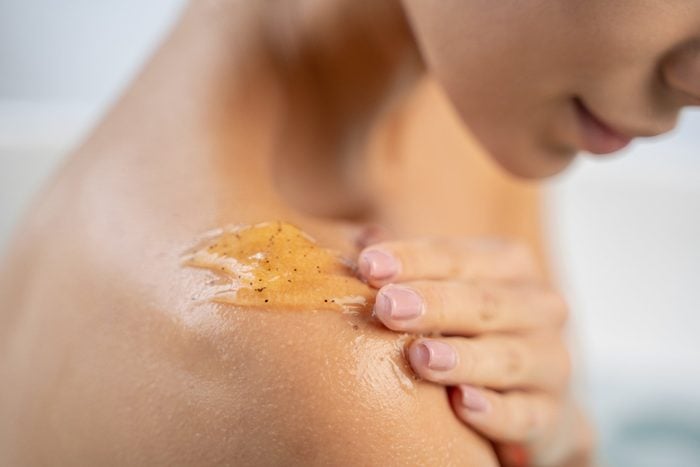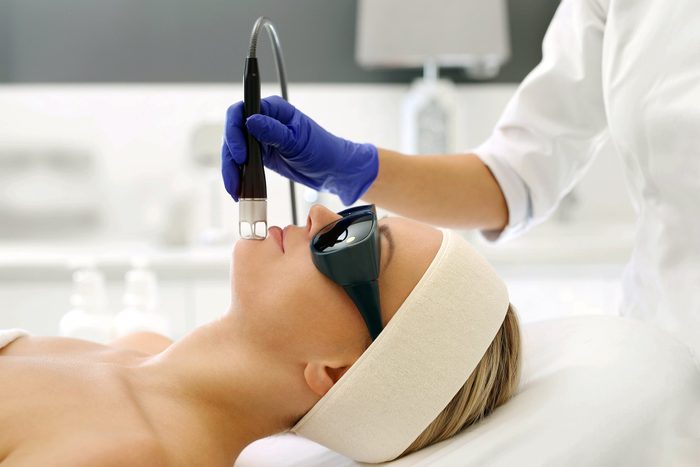
When to start these skin care practices
Taking good care of your skin goes way beyond washing your face. There are moisturizers, chemical peels, laser treatments, and anti-aging serums that will protect and nourish your skin. We checked with dermatologists about the best skin care practices for every age. Here’s their advice for keeping your skin healthy.

First tip: You’re never too young for sunscreen
There are some vital skin care practices you should be practicing basically from birth. While you can’t go back in time to slather your baby self in sunscreen, you can at least make the right sunscreen choices for your children and for yourself now. “For children, I recommend a physical sunscreen—one with zinc oxide or titanium dioxide, over a chemical sunscreen,” says Julie Russak, MD, of Russak Dermatology Clinic. Chemical sunscreens can cause irritation or allergic reactions because a chemical sunscreen is absorbed instead of just sitting on the top layer of skin. It’s also imperative you wear sunscreen even in winter. To make it a default part of your daily routine, use a makeup primer, moisturizer, or foundation with built-in SPF.
When should I start an exfoliating routine?
“Exfoliants should be used beginning in the teen years to clean pores, protect against acne, and clear dead cells from the skin surface,” says Gerald Imber, MD. “Whether your skin is oily or dry, regular exfoliation is necessary from your middle teenage years on, to promote a smooth skin surface and to minimize pores,” says S. Manjula Jegasothy, MD, of the Miami Skin Institute. Studies show that an uneven buildup of dead skin layers may contribute to a dull complexion and possibly even non-melanoma skin cancers later in life, she adds.

How old should I be to consider laser treatments?
“Some patients receive laser treatment for acne scarring or acne breakouts from their teenage years,” says Dr. Russak. “Depending on the laser and what you’re being treated for, you can start in your late teenage years.” Alongside early laser treatments, Dr. Russak recommends taking skin care supplements with collagen and antioxidants. “Remember, you have one skin that needs to last you a lifetime.”
When should I consider chemical peels?
From about your mid-20s. Despite what the name might imply, chemical facial peels are actually gentle solutions that help loosen the bonds that keep dead skin cells together so you can shed them more easily, and reveal fresh, new ones below. “Chemical peels are much like regular exfoliation at home, but on steroids,” says. Dr. Jegasothy. “Whether you have enlarged pores, clogged pores, brown spots, redness, sensitive skin, we can tailor the fruit acid used in your chemical peel to promote a fresh glowing complexion that is pore-free and smooth enough for any makeup to glide on seamlessly,” she says.

When should I start regularly moisturizing my hands?
Hand cream isn’t just a fragrant feel-good—it’s necessary to preserve the thin, delicate skin on your hands, which only gets thinner and more sun damaged with age. Fairer skin types are prone to liver spots or seborrheic keratosis, brown, warty skin growths that may start appearing in your late 30s. For people with darker skin, it’s equally important to moisturize daily to keep the skin hydrated and prevent dehydrated or ashy skin. (Psst: These dermatologist-approved skin care products can help reverse sun damage.)
What about anti-aging eye serums?
If you’re worried about fine lines, this is a good practice to start early, in your mid-20s. “Although you always want to be wearing SPF with eye protection to minimize sun exposure, you can then start wearing an anti-aging cream—one that contains antioxidants and other beneficial factors,” Dr. Russak says. Eye creams help plump out fine wrinkles, but don’t prevent them. If you’re concerned about that, Dr. Imber suggests adding a vitamin C serum in the under-eye area to revitalize and build collagen.

If I’m concerned about lines, when should I start an anti-wrinkle regimen?
“A retinol is great to start, at about the age of 25,” says Dr. Russak. Retinol will help accelerate cell turnover. For best results, consider adding vitamin C, an antioxidant that fights free radicals, so it helps your retinol do a better job. “Not only will such a regimen prevent excessive sun damage, but it will provide chronic hydration and evening of the epidermal skin layer,” says Dr. Jegasothy. (Also, be mindful of these skin products that can secretly damage your face.)
When should I use a full body scrub?
In the same way your face needs help shedding dead skin cells to make space for new ones, so too does the skin on the rest of your body. Instead of just exfoliating your face, be sure to also treat your arms, legs, chest, belly, and beyond. “Full body exfoliation is great from the mid-20s on, simply because it eliminates dead skin buildup,” Dr. Jegasothy says.
Just don’t do a head-to-toe scrub too often. Dr. Russak says that “skin will take up to 20 to 40 days to renew itself once you’re past your teenage years.” So, there’s no need to exfoliate your body more than once a week.

What if I want to protect my neck?
“Lighter skin people who do not wear sunscreen on their neck or use neck cream are more prone to getting a chronic discoloration of their skin called poikiloderma. This is a result of chronic sun exposure—even casual exposure such as during the work day counts,” says Dr. Jegasothy. For all skin types, she recommends a good antioxidant cream.
What’s the deal with body oil?
The key to great-looking skin is hydration, and one of the best ways to achieve a well-moisturized body is by slathering on body oil. “Skin types that are naturally drier would benefit from a body oil at any age,” says Dr. Russak.
Dr. Jegasothy recommends focusing on the especially dry and rough elbows and knees, “especially as you approach your 40s and 50s,” she says.
Next, check out the worst pieces of skin care advice dermatologists have ever heard.
